#NASA has oversight and regulations for a reason actually
Text
It's being estimated that the spaceX launch, lacking the regulation and oversight of NASA launches, might have wiped out as much as 4% of the population of the federally protected Piping Plovers who's nesting site was within the effected area of the launch blast.

But you know, privatising space is cool because billionare fanboys think it's awesome.
#spaceX#environmental impact#environmentalism#protected species#endangered species#piping plovers#capitalism will kill us all#but its starting with the birds#NASA has oversight and regulations for a reason actually#Put scientists in charge of space not business
5K notes
·
View notes
Photo
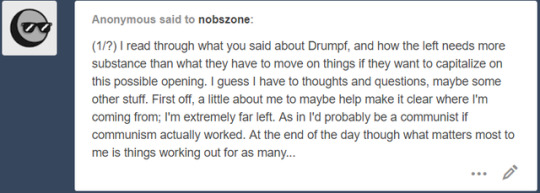
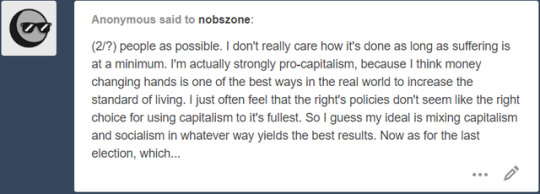
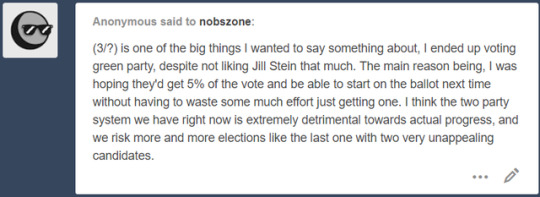
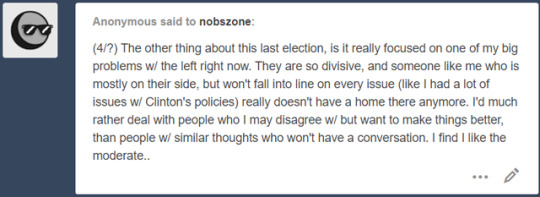

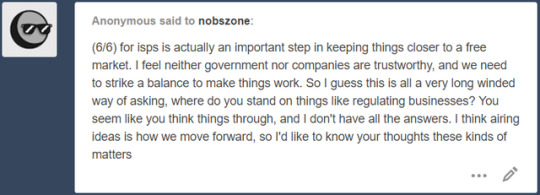
So I was checking my notifications to see which of my posts got the “ @takashi0bump” when I remembered I had this series of asks laying around in my inbox for the past month or so, and I figured now is a good time as any to go over them.
Before we get started, let me apologize to the anon for taking this long to answer. I’ve had a lot going on both on and off the site, and you asked quite a bit here. So I needed a while to get to a point where I felt I was able to properly answer your questions.
So, let’s begin.
First let’s talk about business regulation, and then I’ll give you some of my thoughts on the 2016 election, or at least thoughts that I haven’t had a chance to express yet (anyone who saw my long back-and-forth about a month ago knows I’ve already expressed quite a bit).
I consider myself a Capitalist for two reasons. First and foremost, I believe in an honest day’s work for an honest day’s pay. Secondly, as anyone who’s been following this blog will tell you, I’m a huge proponent of individual liberty.
Out of the three economic systems (Capitalism, Socialism, Communism), Capitalism is the one that gives individual people the best chance at achieving wealth and success for themselves. You look at famous American success stories like Steve Jobs, Bill Gates, Elon Musk, Nelson Rockefeller, Howard Hughes and so on. These are all stories that I don’t believe could’ve happened in a Socialist or Communist system.
But I also acknowledge the system isn’t perfect. It has its flaws and failings, some of which have been pointed out in great detail over the course of the last decade. I also am willing to concede that because of the increasing automation of the labor force as well as the development of technology such as AI, Capitalism itself may no longer be viable in as little as 20-30 years.
Because when your workforce is composed of robots, what do you pay them?
Anyway, that’s for another discourse. My point is that while I don’t think Capitalism is the be all end all perfect system for mankind, it’s the best one that we have under the current circumstances as it allows for the most individual freedom as well as gives individual citizens the best chance to achieve wealth and success.
So with that in mind let’s talk about where I stand on regulation.
I’m...mostly against the government interfering with the private sector, but I’m completely open to certain types of regulation.
For example:
Environmental, to ensure that business activities don’t result in serious pollution and/or environmental catastrophe.
Fair labor rules to enforce my above stated belief in an “honest days work for an honest days pay” (though I will freely admit I’m more in favor of right-to-work laws than unions).
Anti-trust regulations to break up monopolies and keep competition alive.
Net Neutrality to ensure the internet remains free and open (Have you all called or emailed your representatives and/or senators, by the way?)
Safeguards to ensure that people buying property or taking out a loan can actually afford to buy said property or pay back said loan (this is mainly to try and prevent a repeat of 2008).
So, some oversight, but not necessarily to the extent that you’d see in a non-Capitalistic system.
I know it’s popular for folks in my generation to rail on about the “evils of Capitalism” (while typing their rants using technology made possible by Capitalism), but there’s certain areas where I think the private sector is much better suited to excel than any government program would ever be.
One example is healthcare.
Let me say up front that I don’t disagree with the idea of a universal high quality healthcare system. Hell I don’t even disagree with the idea of free healthcare for everyone. I think that giving everyone access to high quality healthcare at an affordable price is a goal we should be working towards.
But my issue with acts like the ACA and other systems like the NHS in England is the economics of it.
At the end of the day, a healthcare system that is of high quality, universal and comprehensive while still being affordable is an economic impossibility.
Basically think of the healthcare market as being like a supply and demand curve that you learned about in your Econ class. The “supply” in this case is the number of doctors available, the quality of the care, etc. The “demand” of course is the people needing healthcare. The equilibrium point is where the two meet.
What the ACA and the NHS try to do is set what basically amounts to a price ceiling. They’re saying “okay, health care of <x> quality will not cost any more than <y> dollars.” Which sounds nice for everyone. More people get access to higher quality care, doctors still get paid, everything is peachy.
Problem is, for said price ceiling to be effective, it has to be set below the equilibrium price. So now there’s a gap between the supply and demand lines: a shortage.
In this case a shortage could mean anything from lack of available doctors, a decline in the quality of the care given, waiting times for surgery, things like that.
And if that’s a trade-off you’re willing to make, more power to you. For me? I think it’s counter-productive.
So with that in mind, here’s my radical idea for helping expand healthcare coverage:
Let insurance companies compete across state lines.
Right now, it is illegal to buy health insurance out-of-state. I think lifting this little restriction will do wonders in helping to alleviate the healthcare crisis in America.
While I can’t be certain, I think that private healthcare could indeed become a perfectly competitive market, with all insurers falling towards an equilibrium price. If someone in one state is charging an astronomical amount for coverage, and someone in another state is offering the same coverage for half the cost, people in the first state should be able to buy from the second state.
In a related story, this would also help people in the LGBT+ community. If you live in a state that denies you coverage because you are a non-heteronormative citizen, you should be able to buy from a state that does not discriminate.
Now I don’t know if this would actually work out, the economics of this can be figured out by people much smarter than I am. But I do feel this is an instance where the private sector can do a better job than the government.
Another area I feel the private sector succeeds is in technological development.
Apple and Microsoft come to mind, but the example I like to use the most is SpaceX.
I want you all to repeat this to yourself once a day for the foreseeable future: Elon Musk is taking us to Mars.
SpaceX has only been operating for 15 years, and already they have technology that only made it to the drawing board for NASA. In a year they may be ready to send manned missions into Space, while NASA’s own spacecraft is still at least 2 years, possibly 3, from its first manned flight. And a lot of this is because SpaceX doesn’t have to answer to any bureaucrats in DC. They’re free to use their budget however they wish, while NASA is only given a sliver of the federal budget, and has to justify every dollar they spend.
In a related story, I’m cautiously optimistic about Trump’s plans for NASA. While it seems he has a very basic understanding of how spaceflight actually works, he does seem to have a legitimate interest in manned spaceflight, which is more than I can say for the last administration.
But I digress.
So I hope that clarifies my position on the free market.
Anyway, now I’d like to talk briefly about some trends I’ve noticed on the left and the right in the wake of the election. Since this post has gone on for quite a bit already, I’ll try to keep this part relatively short.
I find myself in a unique position, where for the first time in my life I am legitimately annoyed by both political parties.
The GOP seems to have looked at how the Democrats all but ceased to exist in 1968 and said to themselves “Lets do that.” They’ve made token statements of annoyance at Trump’s antics, but aren’t willing to do what it takes to reign him in. Sadly, I predicted this would happen, as the GOP is mainly trying to tread water until they get through the midterms next year. Sadly this has allowed for some more...fanatical members to make some noise on the federal and state level, people who basically want to say or do anything and they don’t care who they offend in the process.
Meanwhile the Democrats are a total mess right now. As I’ve said before, I cannot believe they actually rejected Socialism before the Republicans got a chance to do so. But that “Feel the Bern” faction that got...well...burned in the 2016 primaries is still angry and vengeful. You have people like Michael Moore calling for all the neoliberal Democrats to be ousted, and to make the Democrats a true Socialist party. At the end of the day, the only thing the Democrats even have to say to the American people right now in regards to why they should vote for them in 2018 is “We’re not the GOP.”
So yeah, you can see why I’m willing to take potshots at both the left and the right at this point in time (much to the imagined horror of high-school age me who was a raging neocon who absolutely would have voted for Donald Trump if he had the chance, but that’s another story).
But here’s something really interesting I’ve noticed.
As the anon in the ask said, there’s a lot of people on the left who feel that they aren’t welcome there anymore, even though the left is the side that, in theory, should be supporting of them. And a lot of this has to do with the fact that there’s this major “our way or the highway” attitude right now with the liberal elite. And you’ve all heard me express my annoyance with the left’s tendency as of late to (as Tom Walker’s Johnathan Pie character so expertly put it) “believe in diversity as long as it’s not diversity of opinion.”
For better or worse, I haven’t seen that on the right.
I mean, there’s been a couple prominent examples of former Republicans saying they can no longer associate with the GOP. Joe Scarborough being the most recent example (though, honestly, who could blame him?), but the fact is that there’s still a lot of differing ideas and philosophies in play right now for the GOP.
Paul Ryan is a big fan of Ayn Rand and her philosophy of Objectivism, he also supported the auto industry bailouts of 2008 and the Dodd-Frank act.
Rand Paul is a Libertarian (when he feels like calling himself one) who wishes to ban abortion entirely, and while he is not an advocate for decriminalizing marijuana, he is against mandatory minimum sentencing for drug crimes.
John McCain has come out against universal healthcare (also favoring a free-market solution) and Net Neutrality, but he’s also been one of the most vocal proponents of Native American issues as well as one of the most hawkish voices on the right in regards to Russia.
Donald Trump...well...nobody really knows what he supports, as his statements on his political views can range from inconsistent to downright incoherent, but he has consistently supported medical marijuana, term limits for Congress, and manned exploration of space.
Reminder that the Log Cabin Republicans also exist.
The point is there’s a lot of room on the right for differing viewpoints. And I’ve found that even if people can’t completely agree with the GOP on everything, they still don’t have an issue at least relating to them. I personally don’t see eye-to-eye with the Republicans on everything, but I have no problem voting for them, or describing myself as being conservative on certain issues.
And, most importantly, at no point have I ever felt alienated from my more hardcore GOP friends because my beliefs didn’t align with the party.
So, all things considered, it seems that when it comes to diversity of opinion, the Republicans are doing a better job.
Why is that? Well I think it’s because both parties, at their core, have a very different philosophical approach to how they wish the United States to be. Though to be clear, this doesn’t just apply to the US of A, this applies to the left vs right debate pretty much everywhere.
The left’s political philosophies (starting at moderate Liberalism and going all the way to Collectivism) put more emphasis on what’s best for the group. The old “the needs of the many outweigh the needs of the few” cliche. The left’s approach to a problem is to basically say “okay we’re going to try one solution and one solution only, but it’s going to be the solution that benefits everyone in some way.”
In a related story, this is why I think a lot of millennials are gravitating towards the left. Thanks to the Internet, we are the first generation in the history of humanity to have actually been part of a truly global community. And it’s not just in politics where this group mentality comes into play. Hell half the time there’s fandom drama, it’s because someone said something stupid and everyone else decided to get together to prove how wrong they were.
It’s important to realize that our parents and grandparents didn’t have this kind of global community. In fact, for about half a century, they were taught to fear the other, the foreigner, the people with the incompatible lifestyle who were out to destroy you.
This is why I think they gravitated towards the right, because the right (starting at moderate Conservatism and going all the way to Objectivism) focuses more on what’s best for the individual. Whether it’s success in the free market, the right to own a firearm, the right to pick your healthcare provider, etc. The right is more focused on individual liberty. Their approach to a problem is to basically say “okay, everyone try the solution that they feel works best for them.”
So that’s what I think it comes down to. And both mindsets have their pros and cons.
The left would restrict individual liberty, but they would also aim to make a world where everyone is treated fairly and has the same quality of life.
The right may not care about those social protections and some people would be better off than others, but they would also aim to make a world that had unlimited freedom and choice.
And this is the important part. Do yourself a favor and write it down on your desktop or something so you can see it every single day. Because in times like these, this cannot be stressed enough:
Neither the right nor the left are inherently evil. They BOTH have villains: the extremists who want to do EVERYTHING one way.
Whether it’s the alt-right or the cntrl-left, those camps just want to stick to their way and their way only. The truth of the matter is that just going one way gets us nowhere, and as much as people in both of those camps like to mock centrists, the answer really does lie somewhere in the middle.
I like to think of America as like a car driving down a road. For the most part, we try to stay in the center. But every so often the road turns or shifts, and we have to adjust to the left or the right to stay where we need. But we should never ever make a hard left or hard right, that would end in disaster.
Alright, so that’s the end of this wall of text. If the original anon is reading this, I again apologize for taking so long and I hope I was able to give you satisfactory answers to at least some of your questions.
As for the rest of you, I hope you at least learned a little bit more about how I view the world we live in. If you yourself have any questions about my views on all this, feel free to ask!
26 notes
·
View notes
Text
Adaptive Markets
The Efficient Market Hypothesis is the most widely accepted theory for how the market works.
If you’ve taken an Economics 101 course, you’ve probably heard about the predominant theory about how the markets work: the Efficient Market Hypothesis, or EMH for short.
In a nutshell, EMH theory suggests that the price of stocks, bonds and similar investment assets will always provide an accurate reflection of the health, profitability and general value of a company.
In recent years, it’s become widely accepted that the EMH isn’t perfect, but academics and leading experts in the investment sector still regard it as the best theory out there.
To see the EMH in action, let’s look at the company Morton Thiokol, which helped make rockets for NASA in the 1980s, including the faulty piece of equipment that was found to cause the Challenger Space Shuttle explosion in 1986. It made perfect sense that the value of Morton Thiokol shares plummeted in the minutes following the Challenger disaster because the company had just encountered a serious setback.
The EMH works because it takes into account the collective wisdom of all the investors who are constantly analyzing the market and reflecting their best assessments of how well businesses will do in the price they’re willing to buy and sell their assets at. It’s generally agreed that by putting together all these active financial minds, you’ll get a fairly accurate reflection of a company’s value.
Now, given this high regard for the EMH’s accuracy, it is also considered highly unlikely that anyone can “beat the market,” which would involve spotting something that everyone else has missed. And since you can’t beat the market, the standard advice is to “join the market” by investing in long-term, low-risk index funds, or mutual funds, which comprise a collection of stocks that will remain more or less untouched over time.
By sticking with index funds for a long period, a patient investor can expect to take advantage of the stock market’s gradual increase in value over time. It was these standard principles of EMH that led John Bogle to create the Vanguard Index Trust, the first mutual fund, in 1976.
Since then, the index and mutual fund businesses have become a multi-trillion-dollar staple of the finance industry.
The Adaptive Market Hypothesis takes into account the human element of finance.
You might be thinking, if the Efficient Market Hypothesis is so accurate and simple, why do huge financial crises where assets are grossly misvalued, like the one in 2008, keep happening?
The answer to this question has to do with human nature and the fact that those in control of the market are prone to making decisions based on irrational emotions. So, even if a company is by all accounts healthy, if the price of its stock takes a momentary dip, this can trigger a panicked response among traders worried about losing too much money and, in turn, will cause them to sell. This is known as behavioral economics.
Therefore, what we need is a paradigm that takes into account both the logical rules of EMH and the illogical rules of human nature, which is exactly what the Adaptive Market Hypothesis does.
Essentially, the Adaptive Market Hypothesis looks at the market from an evolutionary standpoint to recognize that everything happens for a reason. For example, when John Bogle introduced a new feature to the Vanguard Index Trust known as market cap weighted indexes, this was a response to increased competition and a way for Bogle’s mutual fund to require even less work from portfolio managers.
Since mutual funds using Bogle’s new feature require less oversight, they cost less time and money to maintain, which in turn makes them more attractive to investors. So, if we look at market cap weighted indexes through the lens of evolution, it’s no wonder that this feature can be found in just about every one of today’s mutual funds; they’re the result of competition, innovation and natural selection, all taking place within the environment of an efficient market.
Likewise, we should also consider seemingly illogical human characteristics, like overconfidence and fear of losing money, as natural parts of our own evolutionary desire to survive within the environment of the economic system. As the Adaptive Market Hypothesis shows us, all of these things can help us understand changes in the market.
Humans are reliably irrational in dealing with money.
One of the limitations of the Efficient Market Hypothesis is that it assumes the rational investors will outweigh the impact of irrational investors. Even if we all agree that humans are bound to make mistakes and use poor judgment, the question remains: how adversely can these behaviors affect the market?
First of all, it helps to understand just how irrational humans are when it comes to taking risks, determining probability and making financial decisions.
Psychologists Daniel Kahneman and Amos Tversky have conducted insightful research that shows how mistaken we can be when it comes to high-risk economic decisions. Their findings show that people tend to be more concerned with avoiding losses than making gains, which means we will generally take greater risks in order to avoid those losses than we will to hit the jackpot.
This tendency is known as loss aversion, and it is an important concept to keep in mind since it plays a significant role in how financially inefficient we can be.
How bad can loss aversion get? Take Jérôme Kerviel, a junior trader at the French investment bank Société Générale. In 2008, Kerviel found himself with €4.9 billion in losses after he tried to cover up some relatively small losses through one reckless trading decision after another. The psychological pressure of loss aversion caused him to repeatedly “double down” instead of simply cutting his losses.
Another irrational tendency is known as probability matching, which occurs when we’re trying to predict what’s going to happen next.
Let’s say we’re at a roulette wheel, and after watching the last few spins, we’ve noticed that red has been coming up more frequently than black; in fact, red has been coming up 75 percent of the time. Due to probability matching, most people’s instinct would be to bet on red 75 percent of the time.
However, if the trend continued and the result was indeed red 75 percent of the time, and we only bet on red 75 percent of the time, our probability of winning would only be 62.5 percent – not such great chances after all. The smarter, but less human, choice would be to bet on red 100 percent of the time and win 75 percent of the time.
Human behavior is shaped by our emotions and instincts.
So, what is it exactly that makes us so prone to reckless and irrational decisions when dealing with money?
Neuroscience suggests that the answer lies in how inextricably linked our decision making is to the emotional part of our brain.
For example, sex, gambling and cocaine all provide the same result in our brain: the release of the neurochemical dopamine, which provides an extremely rewarding, pleasurable sensation. Through extensive research, neurologists have concluded that dopamine plays a central role in causing people to take irrational risks.
This is something that the gambling industry is well aware of, as slot machines are designed to keep dopamine levels pumping so that gamblers will keep at it even as their money disappears. The machines have the added psychological manipulation of framing a loss as almost being a win, which has also been proven to trigger the release of dopamine. So, even if a player only hits two out of the three cherries needed for a jackpot, they get more pleasure than they would if the game was a strict win/lose scenario.
With enough repetition, dopamine-related activities like this can easily become habit-forming and lead to a destructive addiction.
But what’s also important to consider is the state of mind we are in during emotional situations where dopamine is involved. In these moments, we are far more likely to make decisions based on impulse instead of rational consideration.
This is something pilots have to be repeatedly trained to understand. If the engines of an airplane were to fail and cause it to fall from the sky, it would be natural for the pilot to panic and instinctively pull up on the controls. However, this would actually cause the plane to reduce its speed even further and thus make a safe landing much less likely. What the pilot should do is angle the plane downward in order to gain speed such that it can level out for a smooth landing.
Since this is such a counterintuitive response, airline pilots go through hundreds of hours of training in order to overwrite their natural instincts.
Unfortunately, when dealing with money and trying to make the right decisions, we’re often in a fearful state of mind and experience the heightened emotional state of panic that accompanies it. This, in turn, is how we end up making irrational mistakes and piling up avoidable losses.
Survival of the richest is the ultimate force behind competition, innovation and adaptation.
You’ve heard the phrase, “survival of the fittest,” right? It’s a simplification of Darwin’s theory of natural selection, which states that only those with optimal traits will survive within certain species and environments, and over time, we will see these traits become more dominant.
As the Adaptive Market Hypothesis shows us, economies function in much the same way, and it’s the regulators, investors, insurance companies and hedge funds that are trying to survive.
However, rather than “survival of the fittest,” in the environment of financial markets, we can see that the law of the land has become “the survival of the richest.”
This is perhaps best illustrated by looking at how hedge funds have developed over the years.
Hedge funds are partnerships between wealthy investors, and they’re the brainchild of Alfred Winslow Jones, a statistician and sociologist. In 1949, with $100,000, Jones started the first hedge fund as a way to buy favorable stocks he expected would grow in value while selling short the weaker stocks he believed were ailing. By doing so, he was essentially hedging his bets and lessening some of the risks inherent in investing – hence the name hedge fund.
Over the next two decades, this first hedge fund was making annual returns of over 20 percent, and Jones was featured in a Fortune magazine profile. Even though the exact methods used by hedge funds are still kept secret, they were soon popping up everywhere.
This is the evolutionary nature of the adaptive market in action: a new, superior species is introduced and soon begins to multiply and dominate.
Of course, not all hedge funds make the right decisions, and the weak ones can quickly die out. But the effective ones are often wildly successful and, to this day, many new ones emerge each year as the market’s process of natural selection continues.
The Adaptive Market Hypothesis can be used to make better financial decisions.
As we saw in the previous blinks, when the efficient market is working properly, all stock prices accurately reflect their true value. This is known as a state of equilibrium.
According to the Efficient Market Hypothesis, prices tend to fluctuate from time to time, but the market will eventually return to equilibrium. And this is why long-term investments make sense, as they allow you to wait out the fluctuations, safe in the knowledge that it’s just a matter of time before your investments attain their true worth.
It sounds good in theory, but there might be an even better plan that emerges from the Adaptive Market Hypothesis.
After all, there are some markets that will go through downturns longer than any investor can reasonably expect to wait out. For example, the Japanese market crashed in 1991 and remained stagnant for the next 20 years, a period known as the “lost decades.”
No investor should be expected to wait that long for equilibrium to arrive, which is why staying passive isn’t always the best idea. Instead, it’s sometimes best to adapt to the changing conditions of the market.
Let’s say a stock’s price dramatically decreases as a result of a few irrational investors who want to sell at all costs. The efficient market approach would be to ignore this downturn, comfortable in the belief that the price will eventually bounce back.
However, in some cases like this, what’s known as a behavioral premium may arise. This is when the irrational action becomes the dominant train of thought and more investors start pushing to sell, thus adversely affecting the long-term value of the company. In this scenario, relying on the efficient market would be unwise.
The better reaction would be to take a dynamic approach and always be ready and willing to change your investments according to whatever situation may arise. In the above example, this would mean also selling the shares that are plummeting in value.
Financial crises are the result of markets evolving without proper oversight.
Following the 2008 financial crisis, when investors were faced with the tough decision of how to react, many of them started casting blame and looking for explanations. So what happened?
Most financial crises are an example of what happens when a market changes faster than investors can adapt.
In most situations, adaptation happens over long stretches. For example, the great white shark has had 400 million years to become one of the ocean’s deadliest animals. But if you take it out of the water and place it on land, it wouldn’t be able to adapt to the radically different conditions and soon perish.
Many financial institutions are just the same: they’ve spent decades doing things one way and struggle to adapt to radical change.
In the 1990s, the financial market underwent a series of unprecedentedly rapid changes, and at the heart of it all were new adjustable-rate mortgages. To make the most of these new mortgages, a number of new business options emerged, like collateralized debt obligations, which packaged the mortgage in a fancy new securities bundle, and credit default swaps, which could be used to buy and sell insurance against debt, thereby encouraging even more investors to join the fray.
When these new possibilities took off, a housing bubble was created. By 2003, over $3 trillion worth of mortgage-related securities were issued in the United States; meanwhile, with a few exceptions, economists continued to be largely oblivious to the potential consequences surrounding these mortgages.
Then, in 2006, housing prices peaked and began to fall while interest rates were on the rise. As a result, many homeowners were forced to default on their mortgage payments, triggering a chain reaction where the value of banks’ investments plummeted, dragging share prices down and resulting in a full-on panic.
By the time people realized what was happening, it was too late; the entire mortgage industry was collapsing, and the financial industry was going down with it.
By looking at things in light of the Adaptive Markets Hypothesis, we can get a better understanding of what happened. But could the theory even have prevented the crash from happening in the first place?
The Adaptive Market Hypothesis can cure more than just our financial system.
If the Adaptive Market Hypothesis can help us see what went wrong in 2008, can it perhaps also point us to a better way forward, with more reliable markets?
What history tells us is that we need better legislation to help prevent greed and fear-based decisions from ruining and damaging our economy.
Robust legislation can play a central role in keeping our financial systems in check. After the crash of USAir Flight 405 in 1992, the National Transportation Safety Board (NTSB) determined that the crash was not caused by faulty technology or any wrongful action on the part of the crew; rather, it was the result of systemic flaws within the aviation industry.
Since it is an independent organization separate from the airline industry, the NTSB was able to conduct an effective investigation and offer its unbiased findings, which allowed them to point the finger at irresponsible airlines and inadequate regulations.
If we really want to prevent future financial crises, we need a financial equivalent of the NTSB to investigate and analyze current problems and determine better regulations.
Ultimately, what the industry should strive for is a way to make the world a better place.
There’s no reason why the financial industry should remain synonymous with greed and selfishness when it could use its power for the good of all humankind.
For example, there’s currently very little private investment being made in the field of biomedicine, since it’s considered a high-risk field in which rewards usually take ten years or more to arrive. But if we gave this field the kind of attention we’ve given others, we could very well cure cancer within our lifetime.
For example, there could be a “CancerCures” fund, managed by a panel of biomedical experts and experienced healthcare investors. Within it could be 150 independent research projects funded by public investors through the use of bonds, similar to the kind that helped fund the allied war effort during World War II.
These research projects could be organized in a diversified manner to reduce risk and offer a high likelihood of good returns. With 150 independent projects looking at a wide range of treatments, we can estimate a 98-percent probability that at least three of them would be successful.
This would combine mass investment with a nearly guaranteed payday! And it needn’t stop at cancer. With this kind of model, there’s no limit to the possible advances humanity could make.
Final summary
The key message in this book:
We’re long overdue for a new approach to our financial markets, one that acknowledges the human flaws of those participating in the system and recognizes the great potential the system has to do good. This is what the Adaptive Markets Hypothesis attempts to provide by incorporating the evolutionary element of markets.
Suggested further reading: What Every Angel Investor Wants You to Know by Brian S. Cohen and John Kador
What Every Angel Investor Wants You to Know (2013) offers start-up entrepreneurs tips on what to look for in an investor – and how to actually get an “angel” to invest. With solid preparation and a good understanding of what motivates an investor, any entrepreneur can secure financing for her next big idea.
0 notes